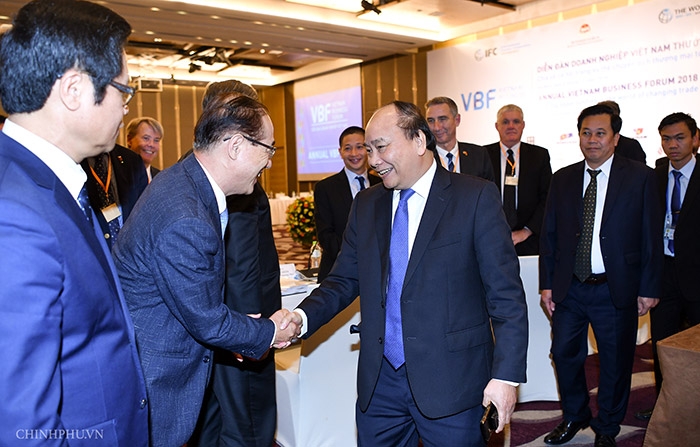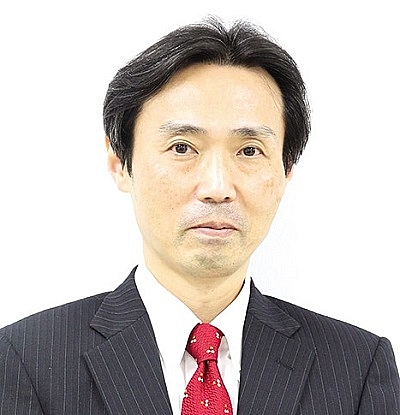VBF 2018 urges Vietnam to push home advantage
 |
| The VBF called on policymakers to seize the momentum and push forward with reforms |
Tony Foster, managing partner at Freshfields Bruckhaus Deringer’s office in Vietnam, has participated in the Vietnam Business Forum (VBF) for 20 years. As head of the VBF’s Infrastructure Working Group, he has shared his expectations that more business issues in the country can be resolved.
Attending the VBF last week, Foster encouraged businesses to speak about barriers in development of infrastructure projects, with this years’ focus being the public-private partnership (PPP) format.
“The problems resolved at VBF are simply too many to count,” Foster said. “The forum is a really useful policy dialogue between the Vietnamese government and the private sector. Each year, many new problems emerge and many of them are solved effectively after the VBF,” he told VIR.
PPP was one of the top concerns raised at this VBF and is an example of proving the effective performance of the forum and its contribution to the private sector.
NEW MOVES IN PPPs
Foster and his partners now can pin high hopes on more workable partnerships in the near future with the latest moves from the Vietnamese government to set up the PPP Committee under the National Council on Sustainable Development and Competitiveness Improvement.
The long-awaited new PPP Law is being fast-tracked, and will deal with the thorniest issue facing investors – the risk-sharing mechanism and government guarantee.
“As expected, the PPP Law will be submitted to the National Assembly at its seventh session [on May and June 2019], and is expected to be approved at the eighth [on November 2019],” said Nguyen Dang Truong, director of the Ministry of Planning and Investment’s Public Procurement Agency, which is tasked to work on the new law.
Going back to 2015 when Decree No.15/2015/ND-CP took effect, it marked an important milestone in PPP policies. Build-operate-transfer (BOT) became a form of PPP and other new, unprecedented forms of PPP concession contracts were permitted. It was an upgraded and permanent version of Decision 71’s pilot PPP programme and was designed to facilitate private and foreign investment in Vietnam’s challenging infrastructure development world.
The improvement continued when earlier this year the prime minister issued No.63/2018/ND-CP, coming into effect in June 2018 and replacing Decree 15, showing the government’s strong effort to provide a workable basis for PPP projects. Many positive changes are being made to facilitate these projects, with the equity capital of the investor and the increase in accessibility to government guarantees for PPP projects among those gaining the most attention.
STRONGER COMMITMENTS
In the spirit of creating a more enabling government, Prime Minister Nguyen Xuan Phuc last week addressed the VBF and ordered ministries, agencies, and local authorities to continue with administrative and judicial reforms and the equitisation of state-owned enterprises, as well as improvements of the financial system, management of public debts, and quality of human resources.
“Ministries must further remove unnecessary business conditions, while cities and provinces have to prioritise business concerns in their working agendas. The target in 2019 is to reduce at least 50 per cent of requirements for project investment,” the PM stressed. “The government commits to reform the tax system towards increasing its transparency, simplification, and effectiveness to the ease financial burden on businesses. The government will give more priorities to investment in science, technology, education, and training; research and development capacity; and infrastructure development, especially intelligent and digital infrastructure to tap into the benefits of Industry 4.0.”
There was good news for the businesses community last month as the government issued Resolution No.139/NQ-CP 2018 on an action plan to cut financial burdens on businesses. If carried out effectively, enterprises are expected to enjoy at least 10 per cent cuts in fees.
SOLVED AND UNSOLVED
Over the past 21 years, the VBF has helped the government issue numerous policies and action plans to solve varying business barriers, with Resolution No.19/NQ-CP on improving the business environment and Resolution No.35/NQ-CP on supporting and developing businesses by 2020 being the highlights.
Business administration and access to electricity are two of the most improved areas. Business registration procedures have seen positive changes, with 13 per cent of firms applying online. The one-stop shop mechanism is proving efficient thus far.
Local authorities have published an index evaluating competitiveness of its departments, districts and sectors, and businesses evaluate government authorities at district level, which brings obvious effects on improving the quality of governance.
Infrastructure has recently improved with a high percentage of businesses being satisfied with the high quality of infrastructure services such as telecommunications (78 per cent), electricity (74 per cent), clean water supply (67 per cent), Internet (62 per cent), industrial zones (46 per cent), and transportation (41 per cent).
Specialised inspection reform has seen some improvements. The inspection and examination of businesses have positively changed, with the rate of businesses being inspected and examined twice or more per year, standing at 48 per cent in 2016, but down to 40 per cent last year. Within this group, 26 per cent of firms said there was a duplication of content between inspections in 2016, which was reduced to 13 per cent in 2017.
The improvements have contributed to the country’s impressive Global Innovation Index 2018 ranking, and good business perspectives in economic prospects.
Despite all this, Vu Tien Loc, chairman of the Vietnam Chamber of Commerce and Industry, said that a number of issues remain and hinder business development.
The reduction of business conditions is a positive signal. However, according to a 2017 survey, 58 per cent had to apply for a conditional business license, of which 42 per cent said that they had difficulties while doing so. There is a lack of consistency between the criteria for the removal and retaining of regulations. For example, business conditions requiring qualifications are removed in some decrees, but remain in others.
In Resolution 19, areas on bankruptcy, investor protection, and procedures of import-export have been evaluated as having slower improvement.
The procedures for registration of real estate, though improved, are still carried out on a case-by-case basis and are not connected nor co-ordinated with construction procedures, notarisation, and tax payment.
Judicial reform has made progress in publicising the adjustments and legal precedents, but is slow in implementing simplified procedures and electronic courts. The percentage of businesses willing to file a case tends to decrease, mainly on the grounds of the lengthy process. Businesses who have sued tend to use more informal dispute resolution than those who have not done so.
Administrative reforms improved in many provinces, but the implementation of online procedures is still slow and problematic. Provinces and cities have electronic portals, but some useful and helpful information for firms, such as local plans and investment projects, are rarely posted.
“Because of remaining issues, the rankings of Vietnam’s business climate and competitiveness index by the World Bank and the World Economic Forum have not improved as expected,” Loc said. “We urge ministries and local governments to take action now amid the enforcement of landmark free trade agreements, otherwise they may become barriers to national development.”
| The latest incarnation of the Vietnam Business Forum, a policy dialogue between the Vietnamese government and local and foreign businesses held twice a year, took place in Hanoi last week. VIR outlines the major challenges international business associations have been encountering while doing business in Vietnam, and their recommendations on what the government and authorised agencies could do to support them to prosper and make ever-greater contributions to the country’s development in the 4.0 era. Nicolas audier, Co-chairman, European Chamber of Commerce in Vietnam
The European Chamber of Commerce in Vietnam (EuroCham) appreciates the recent efforts of the Vietnamese government to further improve the business environment and increase competitiveness. One of the challenges for the country to meet the international standards in key industries is in the pharmaceutical sector. Our members see two specific opportunities to encourage further foreign direct investment (FDI) and build an even better healthcare system for Vietnamese patients. Our members applaud the government’s progress in providing a clear, viable legal framework for operations. This will enable the state and private sectors to work together long-term for the benefit of patients and the public. To ensure that this is as effective as possible, our members request a feasible, predictable transition period to ensure companies can maintain high standards and continue to provide the best possible treatment solutions. The EuroCham Healthcare Forum is proud to have signed a consensus framework for ethical collaboration in Vietnam with a wide range of healthcare organisations, and we would like to seek the support of the government to our international ethical standards in the healthcare sector here. Turning to medical devices, EuroCham’s Medical Devices and Diagnostics Sector Committee (MDDSC) supports the government’s aim to provide hospitals with modern equipment. The private sector will be crucial to achieving this, and our members are keen to help improve medical examination and treatment for patients. However, a lack of clarity and coherence between various ministerial documents and long term solutions regarding the model of placing equipment is inhibiting the success of this initiative. In particular, it is creating problems not just in the placement of new equipment, but also in the management of current equipment in hospitals. This risks delaying urgent testing and treatment, and undermining continuity of care in these establishments. To address this issue, the MDDSC recommends that the government examines the public-private model for the health sector and circulate clear, coherent guidance on the placing of equipment in public health establishments. We believe that by addressing these challenges, the business environment in Vietnam will be able to take full advantage of the upcoming opportunities. Kenneth Atkinson, Chairman, British Business Group Vietnam
We congratulate the Vietnamese government on their continued progress to a more open and transparent business environment. The enforcement of tax penalties remains a concern to business. There is a strong feeling amongst the foreign business community that overseas companies are being targeted by the tax and customs offices in an effort to increase tax collections and revenues to help reduce the fiscal deficit. It is our experience that the majority of our members and the majority of foreign companies in Vietnam have a good understanding of the need and benefit of paying due tax in a timely and accurate manner. The BBGV have concerns. Firstly, the problems this is causing to our members who are already established here in Vietnam. Whilst we do not condone either tax evasion or avoidance in any form, we appreciate that administrative errors can and do occur. These errors can be caused internally within Vietnam, often due to the differences in interpretation of the tax and customs laws and regulations, even between the same departments in different cities and provinces. The under resourcing of staff in the tax and customs departments often means that inspections take place late and up to five years after the reporting period. Where there are genuine administrative errors, which are not challenged for up to five years, the administration fines and late payment penalties are considered unfair and onerous. Companies have to pay late payment penalties because the tax office is unable to carry out annual inspections in a timely fashion. The late payment penalty is being calculated at an interest rate of approximately 20 per cent annually which when calculated for five years more than doubles the original amount due. International companies do have a feeling of injustice of being required to pay these fines and penalties, when the cause is completely outside of their control having lodged the papers in a correct and timely fashion. To help resolve these issues, the BBGV would like to see the creation of an independent body which can hear appeals from taxpayers against administrative fines and penalties from the tax officers. Secondly, we are concerned about the ultimate damage that could be caused to attracting future foreign direct investment, if a solution is not found. Attracting companies to invest and trade with Vietnam depends on many factors including the transparency of doing business and the tax regime. Whilst this issue remains one of concern to businesses already based in Vietnam it will continue to be a factor for new companies looking at benefits and obstructions to creating a new operational base within the country. Ryu Hang Ha, Chairman, Korea Chamber of Commerce in Vietnam
The era of the Fourth Industrial Revolution has begun, with new industries emerging constantly. Therefore, it is time for the two countries to prepare for “Korea-Vietnam Co-operation 2.0” in line with the new era. Industry 4.0 originates from technology and ideas, and both of them stem from the fingertips of human beings. Thus, it is the key to develop human resources. Vietnam is experiencing difficulties in establishing a foothold in this revolution despite the rapid economic growth because they are heavily specialised in labour-intensive industries. In other words, it is important for the government to dedicate itself to nurture technical personnel and specialists for high-tech industries even if that will take considerable time and budget. It is obvious that technology transfer is integral in improving the situation. However, the country also needs to make bold decisions to purchase advanced technology when necessary. Otherwise, it faces limitations if attempting to solve the problem simply by attracting foreign companies. Meanwhile, companies should be able to hire different levels of technicians or specialists to meet their business needs. To do so, the national certification must be further subdivided according to the sector and level. MIchael Kelly, Chairman, American Chamber of Commerce in Vietnam
Our members have had a transformative role in the development of Vietnam. From managerial practices to business ethics, the US business community has affected Vietnam in many positive ways. The ongoing US-China trade tensions have highlighted the risk of concentrating production bases in a single country and are triggering supply chain reorganisation. A recent AmCham survey of US firms in China showed that one-third either had moved or were considering moving some production abroad amid the dispute. The question is how Vietnam can fully capitalise on this opportunity in order to continue its rapid upward economic trajectory. It is no secret that Vietnam attracts a lot of foreign investment. Some government officials question whether having so many foreign companies is good for the country’s economy. For example, a member of the National Assembly recently said, “With foreign businesses accounting for over 70 per cent of total exports, Vietnam will suffer when they leave the country.” All of us want to make sure there is no reason that companies should leave Vietnam. That is why we need to see continued and tangible progress on the issues discussed at the Vietnam Business Forum. Importantly, non-productive red tape must be controlled and the country’s regulatory and tax framework must be stable and predictable. Koji ito, Chairman, Japanese Chamber of Commerce and Industry
On behalf of JCCI, one of the areas that I expect the Vietnamese government to consider or take action to enhance the country’s investment climate and strengthen linkages between Vietnamese and Japanese firms is Public-Private Partnership (PPP) projects. In recent years, the government has strengthened measures to inhibit borrowing because the public debt to GDP ratio is now close to the 65 per cent ceiling set by the National Assembly. Nevertheless, we believe that infrastructure development is vital to Vietnam’s long-term growth and the active introduction of public-private partnership (PPP) schemes is certainly one of the most effective ways to do so. For instance, the introduction of Decree 63 in May 2018 has simplified PPP procedures, such as eliminating the need to obtain an investment registration certificate for projects. However, we propose four aspects of the decree that the government can consider reviewing to enhance its effectiveness in promoting infrastructure growth in the country. First, clearly stipulate that “foreign law” may be specified as the governing law. Second, allowing dispute resolution by arbitration outside Vietnam on all infrastructure projects, including those involving real estate. Next, allowing investors and project executors to mortgage land use rights, assets on land and the right to operate project facilities. Finally, ensure that the Vietnamese government shares a certain amount of risk pertaining to the termination of payments and foreign exchange certificates. Last week, JCCI held a PPP seminar in Hanoi, joined by officials from the ministries of Planning and Investment, and Justice. JCCI commits to continue supporting Vietnam in drawing in more Japanese investments. |
What the stars mean:
★ Poor ★ ★ Promising ★★★ Good ★★★★ Very good ★★★★★ Exceptional
Related Contents
Latest News
More News
- Foreign leaders extend congratulations to Party General Secretary To Lam (January 25, 2026 | 10:01)
- 14th National Party Congress wraps up with success (January 25, 2026 | 09:49)
- Congratulations from VFF Central Committee's int’l partners to 14th National Party Congress (January 25, 2026 | 09:46)
- 14th Party Central Committee unanimously elects To Lam as General Secretary (January 23, 2026 | 16:22)
- Worldwide congratulations underscore confidence in Vietnam’s 14th Party Congress (January 23, 2026 | 09:02)
- Political parties, organisations, int’l friends send congratulations to 14th National Party Congress (January 22, 2026 | 09:33)
- Press release on second working day of 14th National Party Congress (January 22, 2026 | 09:19)
- 14th National Party Congress: Japanese media highlight Vietnam’s growth targets (January 21, 2026 | 09:46)
- 14th National Party Congress: Driving force for Vietnam to continue renewal, innovation, breakthroughs (January 21, 2026 | 09:42)
- Vietnam remains spiritual support for progressive forces: Colombian party leader (January 21, 2026 | 08:00)






 Tag:
Tag:




















 Mobile Version
Mobile Version